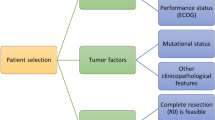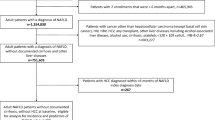Abstract
Background
Chronic hepatitis B virus (HBV) infection is associated with a lower incidence of colorectal liver metastases. We explored the impact of HBV carrier status on outcomes of surgical treatment of colorectal liver metastases.
Methods
A retrospective analysis was conducted for consecutive patients undergoing liver resection for colorectal liver metastases from 2000 to 2016. HBV carriers were matched with controls by propensity scoring.
Results
304 patients with known HBV carrier status who underwent resection of colorectal liver metastases were studied. From the 21 (6.9%) hepatitis B carriers, a more prolonged prothrombin time (12.1 vs. 11.3 s, OR 1.42, p = 0.027) was observed, and fewer major resections were performed (19.0 vs. 47.3%, OR 0.262, p = 0.018). After 1:5 propensity score matching, they were compared with 105 controls with similar liver function, tumour status and receiving similar treatments. Patients with chronic hepatitis B enjoyed better median disease-free survival (15.8 vs. 9.20 month, p = 0.032). Overall survivals (50.0 vs. 43.6 month, p = 0.15) were similar. Operating time (227 vs. 240 min, OR 1.00, p = 0.33), blood loss (0.50 vs. 0.37 L, OR 1.15, p = 0.62), hospital stay (6 vs. 6 day, OR 1.02, p = 0.48), operative morbidity (9.5 vs. 16.2%, OR 0.545, p = 0.44) and mortality (0 vs. 1.0%, OR 1.62, p = 0.77) were comparable. The use of antiviral agents did not affect survival of HBV carriers.
Conclusions
Chronic HBV infection confers oncological benefit to surgical treatment of colorectal liver metastases. Given satisfactory liver reserve, HBV carrier status did not affect operative morbidity or mortality.




Similar content being viewed by others
References
Gomez D, Lobo DN (2011) Malignant liver tumours. Surgery 29:632–639
Geoghegan JG, Scheele J (1999) Treatment of colorectal liver metastases. Br J Surg 86:158–169
Faivre J, Manfredi S, Bouvier AM (2003) Epidemiology of colorectal cancer liver metastases. Bull Acad Natl Med 187:815–822
Uetsuji S, Yamamura M, Yamaicchi K et al (1992) Absence of colorectal cancer metastasis to the cirrhotic liver. Am J Surg 164:176–177
Cai B, Liao K, Song XQ et al (2014) Patients with chronically diseased livers have lower incidence of colorectal liver metastases: a meta-analysis. PLoS ONE 9:e108618
Augustin G, Bruketa T, Korolija D et al (2013) Lower incidence of hepatic metastases of colorectal cancer in patients with chronic liver diseases: meta-analysis. Hepatogastroenterology 60:1164–1168
Song E, Chen J, Ou Q et al (2001) Rare occurrence of metastatic colorectal cancers in livers with replicative hepatitis B infection. Am J Surg 181:529–533
Qiu HB, Zhang LY, Zeng ZL et al (2011) HBV infection decreases risk of liver metastasis in patients with colorectal cancer: a cohort study. World J Gastroenterol 17:804–808
Adam R, Lucidi V, Bismuth H (2004) Hepatic colorectal metastases: methods of improving resectability. Surg Clin North Am 84:659–671
Adam R, Pascal G, Castaing D et al (2004) Tumor progression while on chemotherapy A contraindication to liver resection for multiple colorectal metastases? Ann Surg 240:1052–1064
Choti MA, Sitzmann JV, Tiburi MF et al (2002) Trends in long-term survival following liver resection for hepatic colorectal metastases. Ann Surg 235:759–766
Abdalla EK, Vauthey JN, Ellis LM et al (2004) Recurrence and outcomes following hepatic resection, radiofrequency ablation, and combined resection/ablation for colorectal liver metastases. Ann Surg 239:818–825
Sutherland F, Harris JC (2002) Claude Couinaud: a passion for the liver. Arch Surg 137:1305–1310
Lisa JR, Solomon C, Gordon EJ (1942) Secondary carcinoma in cirrhosis of the liver. Am J Pathol 18:137–140
Doherty DG, Norris S, Maridgal-Estebas L et al (1999) The human liver contains multiple populations of NK cells, T cells, and CD3+ CD56+ natural T cells with distinct cytotoxic activities and Th1, Th2, and Th0 cytokine secretion patterns. J Immunol 163:2314–2321
Okuno K, Hirai N, Lee YS et al (1998) Involvement of liver-associated immunity in hepatic metastasis formation. J Surg Res 75:148–152
Tordjmann T, Soulie A, Guettier C et al (1998) Perforin and granzyme B lytic protein expression during chronic viral and autoimmune hepatitis. Liver 18:391–397
Song E, Chen J, Ouyan N et al (2001) Kupffer cells of cirrhotic rat livers sensitize colon cancer cells to Fas-mediated apoptosis. Br J Cancer 84:1265–1271
Seitz G (2008) Warum sind Metastasen in zirrhotischen Lebern so selten? Ultraschall der Medizin 10:123–126
Consolo M, Amoroso A, Spandidos DA et al (2009) Matrix metalloproteinases and their inhibitors as markers of inflammation and fibrosis in chronic liver disease (Review). Int J Mol Med 24:143–152
İşlekel H, Oktay G, Terzi C et al (2007) Matrix metalloproteinase-9,-3 and tissue inhibitor of matrix metalloproteinase-1 in colorectal cancer: relationship to clinicopathological variables. Cell Biochem Funct 25:433–441
Shalinsky DR, Brekken J, Zou H et al (1999) Broad antitumor and antiangiogenic activities of AG3340, a potent and selective MMP inhibitor undergoing advanced oncology clinical trials. Ann N Y Acad Sci 878:236–270
Abdalla EK, Adam R, Bilchik AJ et al (2006) Improving resectability of hepatic colorectal metastases: expert consensus statement. Ann Surg Oncol 13:1271–1280
Fan ST, Lo CM, Poon RT et al (2011) Continuous improvement of survival outcomes of resection of hepatocellular carcinoma. Ann Surg 253:745–758
Author information
Authors and Affiliations
Corresponding author
Ethics declarations
Conflicts of interest
The authors declared that they have no conflicts of interest.
Rights and permissions
About this article
Cite this article
Au, K.P., Chok, K.S.H., Chan, A.C.Y. et al. Impact of Hepatitis B Carrier Status on the Outcomes of Surgical Treatment of Colorectal Liver Metastases. World J Surg 42, 2642–2650 (2018). https://doi.org/10.1007/s00268-018-4483-3
Published:
Issue Date:
DOI: https://doi.org/10.1007/s00268-018-4483-3




